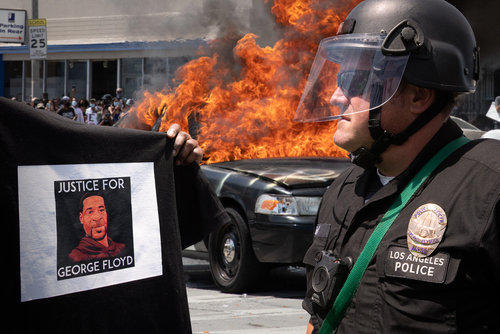
In a recent turn of events, Derek Chauvin, the former Minneapolis police officer convicted for the death of George Floyd, has made headlines from behind bars. In a bold statement during a phone interview featured in a new documentary, Chauvin has labeled his trial and sentencing as a “sham,” casting doubt on the judicial process that led to his 22-and-a-half-year prison sentence.
The documentary, titled “The Fall of Minneapolis,” delves into the controversial case, suggesting that there may have been significant oversights and misrepresentations throughout the investigation and subsequent trial. It brings to light claims that the FBI may have altered Floyd’s autopsy report to indicate death by asphyxiation due to neck compression, a detail originally absent from the report.
POLITICAL PRISONER Officer Derek Chauvin is serving 21 years in jail because of fake charges and tampered/false ‘evidence’
“From false testimony in Chauvin’s trial to police bodycam footage of George Floyd’s arrest that was withheld for two months, to the autopsy report that was… pic.twitter.com/ZvZ6rHuv1S
— TheReal_AnTheFacts©™🇺🇸☦️🇬🇷 (@Real_AnTheFacts) November 20, 2023
Chauvin’s defense is rooted in the training he received as a police officer, specifically the Maximal Restraint Technique (MRT), which involves kneeling on a suspect’s shoulder blade to subdue them. The documentary presents evidence, including training manuals, that supports the claim that Chauvin was employing a technique sanctioned by his department when he knelt on Floyd for over nine minutes.
The film also touches upon the broader implications of the case, suggesting that the rush to judgment by Democratic officials and prosecutors not only affected Chauvin but also contributed to a surge in crime across America. It portrays the situation as a cautionary tale of how media and social pressures can influence legal proceedings.
BREAKING: The United States Supreme Court has decided NOT to hear the appeal of Derek Chauvin’s conviction for allegedly murdering George Floyd, despite much evidence to the contrary.
Are they scared of a race war?
Are they sacrificing this man’s life?
Thoughts? pic.twitter.com/7mdHkzX45J
— ᴊᴀᴄᴋ ᴅᴀɴɢᴇʀ (@AmericazOutlaw) November 20, 2023
Chauvin’s mother has come forward in the documentary, presenting his training manuals to corroborate her son’s adherence to his training. This move is seen as an attempt to humanize Chauvin and to show that his actions were within the scope of his professional duties.
The documentary further criticizes the response time of emergency medical technicians (EMTs) to the scene, with Chauvin himself noting the abnormal delay despite the proximity of an ambulance bay. This point is raised to question whether more timely medical intervention could have changed the tragic outcome.
Alex Chueng, another officer involved in the incident who is also serving time, has urged the public to view the documentary and learn from it. He describes prison as a transformative experience and insists that this event will not define him or his colleagues.
Despite these assertions, the Supreme Court has recently denied Chauvin’s appeal to overturn his conviction, leaving the state court rulings in place. His legal team had argued that the intense pretrial publicity and the potential for violence if he were acquitted compromised his right to a fair trial.
The documentary, crowdfunded and produced by journalist Liz Collin, aims to shed new light on the events surrounding Floyd’s death and the subsequent reactions. Collin herself faced backlash while reporting on the riots following Floyd’s death, due to her marriage to the then-chief of the police union, highlighting the personal tolls and divisions that the case has wrought on individuals and the community at large.
As the nation continues to grapple with issues of policing, justice, and media influence, “The Fall of Minneapolis” serves as a provocative piece in the ongoing conversation about law enforcement and the legal system in America. Whether it sways public opinion or not, it undeniably adds a complex layer to an already deeply contentious case.











